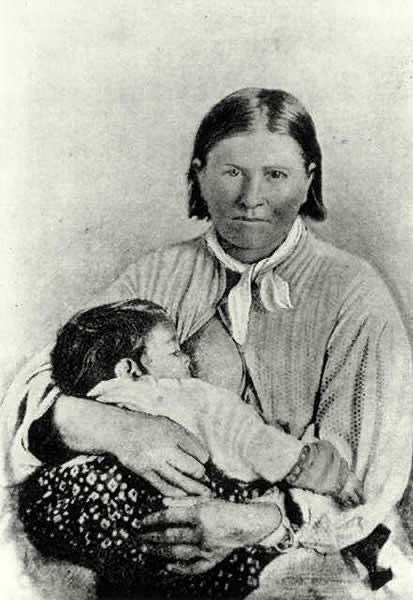Parker

Cynthia Ann Parker, or Narua (Was Found),
and daughter, Topsannah (Prairie Flower), in 1861
" … I carry some of their life lessons within me …"
Cynthia Ann Parker, the niece of my fourth great-grandmother, Rachel Parker, might have been the most famous person in the history of our Fambly. She was the granddaughter of famed frontiersman and Revolutionary War soldier John Parker, Rachel's father, who was also a Predestinarian preacher of a Calvinist sect so conservative that it would have probably refused to grant Calvin admission into their congregation. Parker's vitae reads like a library full of dime-store frontier novels. He helped clear the frontier with Daniel Boone (stay tuned; there's a direct relationship with one of Boone's children in a later chapter), subdued the Cherokee, and generally made life miserable for natives and, later, Mexicans. Steven Austin invited him to migrate into Texas territory in the immediate aftermath of the Alamo debacle, where he founded a fort named after him, which is now Fork Parker State Park near the Texas town of Groesbeck. He was my fifth great-grandfather.
Shortly after he arrived in Texas in 1836, his rough blockhouse fort was overrun by Comanche, who killed him and four of his sons, along with other settlers. His second wife escaped wounded and recovered, but his eight-year-old granddaughter Cynthia Ann was captured. She completely assimilated into the Comanche culture, marrying the son of a chief when she came of age and becoming the mother of the last free chief, Quanah, who is some incalculable blood relation, the son of my fourth great-grandmother's niece. Cynthia Ann was finally found by Texas Rangers twenty-four years later, in 1860, and returned to surviving family members, but was never able to reassimilate into her birth family's lives again.
She was the subject of many media articles and books, including John Ford’s fifties film The Searchers, loosely based on Cynthia Ann's legend. Natalie Wood and her sister Lana played her in the movie. John Wayne found her. Her grandfather and her father fell to that angry Comanche attack, John reportedly obscenely mutilated for his trouble, scalped fore and aft. This was not the beginning or the ending of the Parker line, for one of John's younger daughters, Rachel, had married my ancestor, John U. Jackson, born in 1798. She and John died within two weeks of each other in 1826, along with their infant son Enoch, due to milk sickness, leaving three small children, the middle of whom would become my third great-grandfather, six-year-old Nathaniel Parker Jackson. He would grow up to become another epic figure in my family's saga.
Nathaniel's grandfather, John H. Jackson, and his wife, Nancy (Powell), raised those three orphaned grandchildren. He was the postmaster of his district, an area West of current Cincinnati, OH: Dearborn County, Indiana. He would die in 1848 when crossing Tanner's Creek on his rounds. The creek was high, and the horse stumbled and fell. The saddle girth broke, John U.'s boots became entangled, and he was helpless to save himself in the turbulent waters. He was sixty-eight years old and had fathered thirteen children, including my fourth great-grandfather. He was my fifth great-grandfather, like John Parker.
Death seems imminent in those days. In just two generations, this family suffered mutilations, a drowning, and three tragic poisonings. Both branches, the Parkers and Jacksons, had come from somewhere before they landed there. The Parkers appear to have lived in Virginia for two generations before John came along, and the Jacksons might have arrived as indentures, complements of the crown court of England. Scotch-Irish not infrequently were found sideways to the law after the mid-seventeenth century English Civil Wars. Several of my ancestors arrived as either indentures or so-called Pilgrims, with economic burdens on their shoulders. If they survived their indenture, they often fled for the hills, what's now West Virginia, Kentucky, and even Georgia, as the Parkers had. Many ended up along the Ohio River, like the Jacksons. My third great grandfather Nathaniel Parker Jackson's brother Joseph, became a flat-boater on the Ohio and Mississippi for a few years before he married the daughter of a boat owner and settled down to become a prominent citizen.
I am deeply moved to discover some of my DNA's history. I feel enormous pride and empathy, even for that SOB John Parker, who would probably not offer me the time of day were he to encounter me on the street today. I respect the context within which each of my forebears lived, and I cannot but respect them in return. They faced choices no one alive today could even begin to imagine. I fancy my many facets informed by these ancestors' experiences. I suspect I carry some of their life lessons within me today.
©2024 by David A. Schmaltz - all rights reserved


